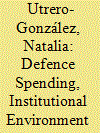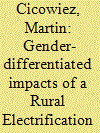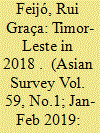| Srl | Item |
| 1 |
ID:
167860


|
|
|
|
|
| Summary/Abstract |
This paper analyses the impact of participating in a military alliance on the nexus between defence spending and economic growth. In particular, we study how the process of gradual association to a military organization influences the defence spending of newcomers, and consequently their economic growth. Conclusions from the theoretical model are tested empirically for countries in the North Atlantic Treaty Organization. Results show that the prospect of intensified military alliance partnership and membership has a positive effect on economic growth. In addition, increased security and stability gained by closer military cooperation reinforces the positive link with economic growth. Empirical evidence supports theoretical priors.
|
|
|
|
|
|
|
|
|
|
|
|
|
|
|
|
| 2 |
ID:
183568


|
|
|
|
|
| Summary/Abstract |
This paper investigates the potential impacts of the Nigerian Rural Electrification Fund (REF-1) on the development of rural communities and specifically assesses the policy's differential impacts on men and women's employment and income. It examines the best approach for the implementation of the subsidy grant that promotes economic activities in the rural areas, in line with the objective of the policy. To that end, a gendered Computable General Equilibrium (CGE) model was employed and data were analyzed under four scenarios against a baseline scenario. The results indicate that as the rural electrification fund increases energy supply, market employment for women, factor incomes, and output in the agricultural sector also rises. Also, the scenario where the subsidy grant was combined with labour and factor productivity, recorded the largest increase overall. The policy implication of these results is that a policy complementary approach is needed to achieve the goals highlighted in the Nigerian Rural Electrification Strategy policy and to produce the desired economic outcomes. In other words, the government subsidy grants on its own to expand electricity supply in the rural areas is not sufficient, it will need to be complemented with policies that enhances productivity and efficiency.
|
|
|
|
|
|
|
|
|
|
|
|
|
|
|
|
| 3 |
ID:
150475


|
|
|
|
|
| Summary/Abstract |
In line with the rising interest in harnessing natural resource revenues for economic and human development through productive government investments, this paper aims to address an important blind spot in our understanding of the “resource curse” by contributing innovative insights on how natural resource wealth impacts government priorities and expenditure practices. Using a large panel dataset of 140 countries covering the period from 1995 to 2009, we find an adverse effect of resource dependence on public education expenditures relative to GDP that is robust to controlling for a range of additional covariates. Furthermore, our findings indicate that this resource curse effect on the government prioritization of education mainly stems from point-source natural resources. These results are of particular importance for the sustainable management of natural resource wealth in developing countries, as they could achieve especially high returns by investing resource revenues in public goods such as education. While this paper underlines the importance of institutions and government accountability, our findings also raise questions on the role of the private sector as a partner in development, as the extractives industry could consider increasing funding for education through Corporate Social Responsibility (CSR) initiatives.
|
|
|
|
|
|
|
|
|
|
|
|
|
|
|
|
| 4 |
ID:
100584


|
|
|
|
|
| Publication |
2010.
|
| Summary/Abstract |
In the past decade, the Japanese government has revamped its budget institutions twice. This paper examines how these changes have changed the configuration of power among the actors in the budget process. It also explores the implications of these changes for the management of the nation's finances.
|
|
|
|
|
|
|
|
|
|
|
|
|
|
|
|
| 5 |
ID:
153298


|
|
|
|
|
| Summary/Abstract |
This article explains failures of politics and government through the incompetence of voters and their perception biases. It illustrates this argument using the French case. If voters lack knowledge and develop irrational beliefs, then voting is probably not effective as a mechanism for sanctioning public policy. The incompetence of French voters and their anti-capitalist bias is well documented. This incompetence can be partly explained by the low cost of holding irrational beliefs in politics. Voters’ anti-capitalist attitudes are explained by the utility they obtain from expressing themselves in favour of state intervention, and by France's prohibitive level of justification costs of holding pro-capitalist views. The resulting biases contribute to the failure of public choice.
|
|
|
|
|
|
|
|
|
|
|
|
|
|
|
|
| 6 |
ID:
165960


|
|
|
|
|
| Summary/Abstract |
This paper econometrically analyses the relationship between public spending and women's and men's urban employment in China for the period 1999–2009. Theoretically, spending on healthcare and education could increase employment growth and women's relative employment via the expansion of paid care work (increasing labour demand) and reductions in unpaid labour (increasing labour supply). To empirically test this, female, male, and relative employment growth are estimated as functions of public spending while both demand-side and supply-side factors are controlled for. Economic growth is also included in a simultaneous equation estimation. While healthcare results are mixed, education spending is positively associated with economic growth, employment growth for both women and men, and women's relative urban employment. Using economic significance calculations, I describe how well-directed public policies can promote both economic growth and long- and short-run benefits in employment equality between the sexes.
|
|
|
|
|
|
|
|
|
|
|
|
|
|
|
|
| 7 |
ID:
164965


|
|
|
|
|
| Summary/Abstract |
Timor-Leste entered 2018 with a political crisis that kept a minority government without the confidence of parliament. President Lú-Olo tried to resolve the situation by calling early elections, but the incumbency effect did not materialize, and the opposition won the polls. Timor-Leste celebrated an important treaty with Australia on their maritime borders in the Timor Sea.
|
|
|
|
|
|
|
|
|
|
|
|
|
|
|
|